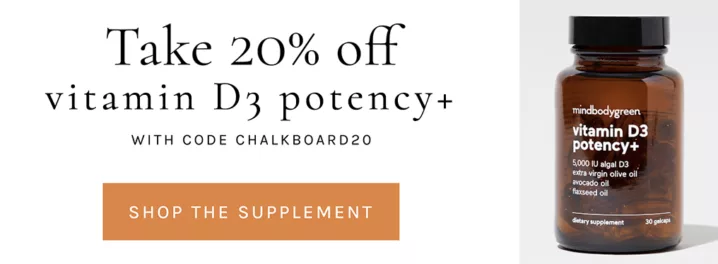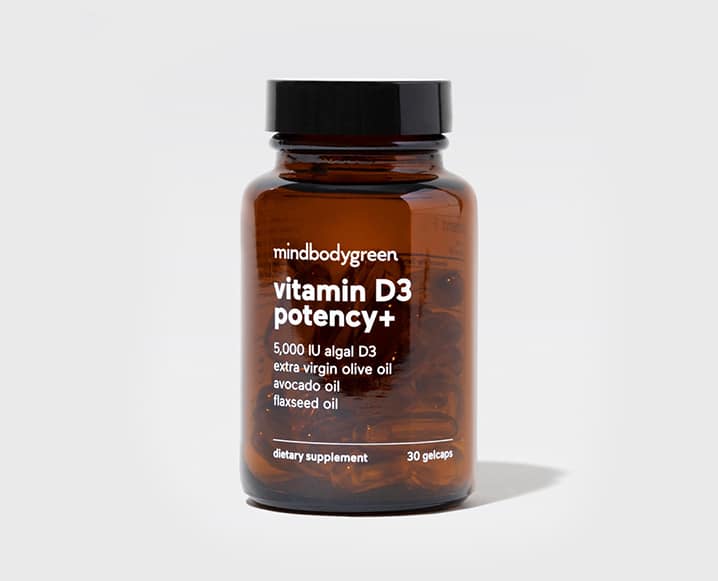
It may be the unfortunate events of a global pandemic that has everyone taking more vitamin D, but with such a breadth of benefits for nearly everyone, we're happy to see this crucial supplement finally get the attention it deserves.
Why You're Likely Deficient In Vitamin D
Nationally representative research shows that over 90% of U.S adults fail to consume even just 400 IU of vitamin D per day through food. When you consider that doctors like Ashley Jordan Ferira, PhD, RDN of mindbodygreen agree that 5,000+ IU of vitamin D is more appropriate for most adults, the dietary gap becomes starkly clear.

While sun exposure and foods like eggs and certain coldwater fish do provide some level of vitamin D intake, unless you’re eating more wild salmon than a bear on holiday, it’s likely a daily supplement is needed to achieve optimal levels (and keep them there).
Vitamin D is one of the most common nutrient deficiencies globally and is practically impossible to restore naturally. Almost 30% of American adults meet the criteria for vitamin D deficiency, and over 40% of the adult population in the U.S. are considered ‘clinically insufficient’ in vitamin D.†
Some of the most common signs of vitamin D deficiency include:
+ mood
+ immunity
+ MENTAL SHARPNESS
+ bone Density
Vice President of Scientific Affairs for mindbodygreen, Ashley Jordan Ferira, PhD, RDN shares, “A vitamin D supplement is unique because it’s relevant to almost everyone. While some supplements are needed on an individual and targeted basis, our diet simply isn’t cutting it for this particular micronutrient.”
“We also know that relying on variable sun exposure won’t cut it, and comes with its own set of risks. Without a vitamin D3 supplement, it is likely that you’re vitamin D deficient (25-hydroxyvitamin D blood level < 20 ng/ml) or insufficient (< 30 ng/ml).”
Vitamin D: A Vitamin And A Preprohormone
Yes, vitamin D is a vitamin, but what many people don’t realize is that it is also a “preprohormone”. Active in the body, vitamin D actually behaves as a hormone!
+ Vitamin D supports immunity.* Optimal vitamin D levels have been shown to positively affect the immune system in a variety of ways, including supporting white blood cell function, helping the immune system adapt to and ward off threats, and more.*
+ Vitamin D promotes gut health.* Vitamin D has been shown to play a role in promoting beneficial gut bacteria, which, in turn, have a positive effect on gut function and metabolism.*
A variety of studies have shown that vitamin D plays a key role in the health and integrity of the gut mucosal lining, which acts as a barrier between your digestive system and bloodstream.*
+ Vitamin D helps support thyroid health.* Vitamin D plays a crucial role in thyroid health as it helps regulate the production of thyroid hormones which have widespread, multifaceted functions in the body including metabolism, weight, mood, the sleep cycle, musculoskeletal health, reproductive health, and immunity.* Thyroid hormones also play a role in keeping your hair, skin, and nails youthful and strong.

mindbodygreen’s vitamin D3 potency+
What makes mindbodygreen’s vitamin D3 potency+ so notable:
+ 5,000 IU per capsule If there is one thing you take away from our story, keep the number ‘5,000 IU’ in mind when you shop for vitamin D*. As always, testing your vitamin levels with your doctor will give you the most effective and accurate information.
+ Sustainably sourced algal vitamin D3 mindbodygreen sources 5,000 IU (125 mcg) of extremely rare, sustainably sourced algal vitamin D3 (as VegD3®) for this—the purest form of plant-origin vitamin D3 (cholecalciferol) in the world. Note that the gelcap is gelatin, as that’s the most natural way to go these days, which means the supplement is not entirely vegan.
+ bioavailable with healthy oils Extra virgin olive, flaxseed and avocado oils have been infused into this supplement because vitamin D is more bioavailable when consumed with healthy fats.* You get the additional benefits of these omega-rich oils daily:
Avocado is rich in the omega-9 fatty acid known to have anti-inflammatory properties and support metabolic health.* Flaxseed delivers a powerful source of alpha-linolenic acid (ALA), an essential omega-3 fatty acid known for its antioxidant and anti-inflammatory actions.* Extra virgin olive oil is concentrated in oleic acid, the celebrated, heart-healthy unsaturated fat that predominates the Mediterranean diet.*
Recommend Intake Vs. Intake For 'Optimal Health'
One thing that most consumers don’t understand is the difference between the National Academies’ ‘daily recommended intake’ and the intake required for optimal health.
According to Ashley Jordan Ferira, PhD, RDN, “The National Academies (formerly the NIH) recommends 200 to 600 IUs of vitamin D a day. That's the amount to avoid frank vitamin D deficiency and issues that go along with that. This is not a goal to aim for but rather a minimum to avoid.”
Ferira and many other trusted nutrition and medical experts believe that 5,000 IU of vitamin D daily is the true goal for vitamin D sufficiency. Ferira even states that some supplement companies assume that consumers will simply take more of their vitamin D supplements (of 400 – 2,000 IU) “as needed”.
for a limited time: Get an exclusive 20% off your first month of vitamin D3 potency+ using code CHALKBOARD20 . Every mindbodygreen supplement is sustainably sourced. Get set up with monthly supplements easily while our exclusive offer lasts.

†Liu X et al. Br J Nutr. 2018;119(8):928-936.
*These statements have not been evaluated by the Food and Drug Administration. This product is not intended to diagnose, treat, cure, or prevent any disease.
This story is brought to you in partnership with mindbodygreen. From time to time, TCM editors choose to partner with brands we believe in to bring our readers special offers. All material on The Chalkboard Mag is provided for educational purposes only. Always seek the advice of your physician or another qualified healthcare provider for any questions you have regarding a medical condition, and before undertaking any diet, exercise or other health-related programs.
The post 4 Telltale Signs You’re Not Getting Enough Vitamin D appeared first on The Chalkboard.
from The Chalkboard https://ift.tt/JWPl4wU
via IFTTT
No comments:
Post a Comment